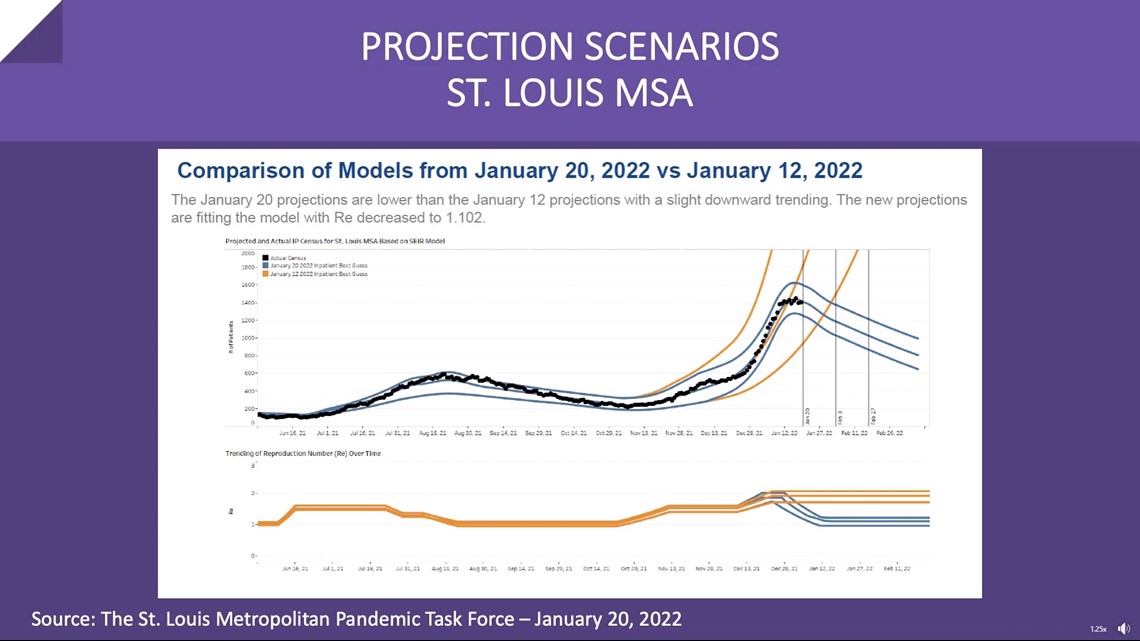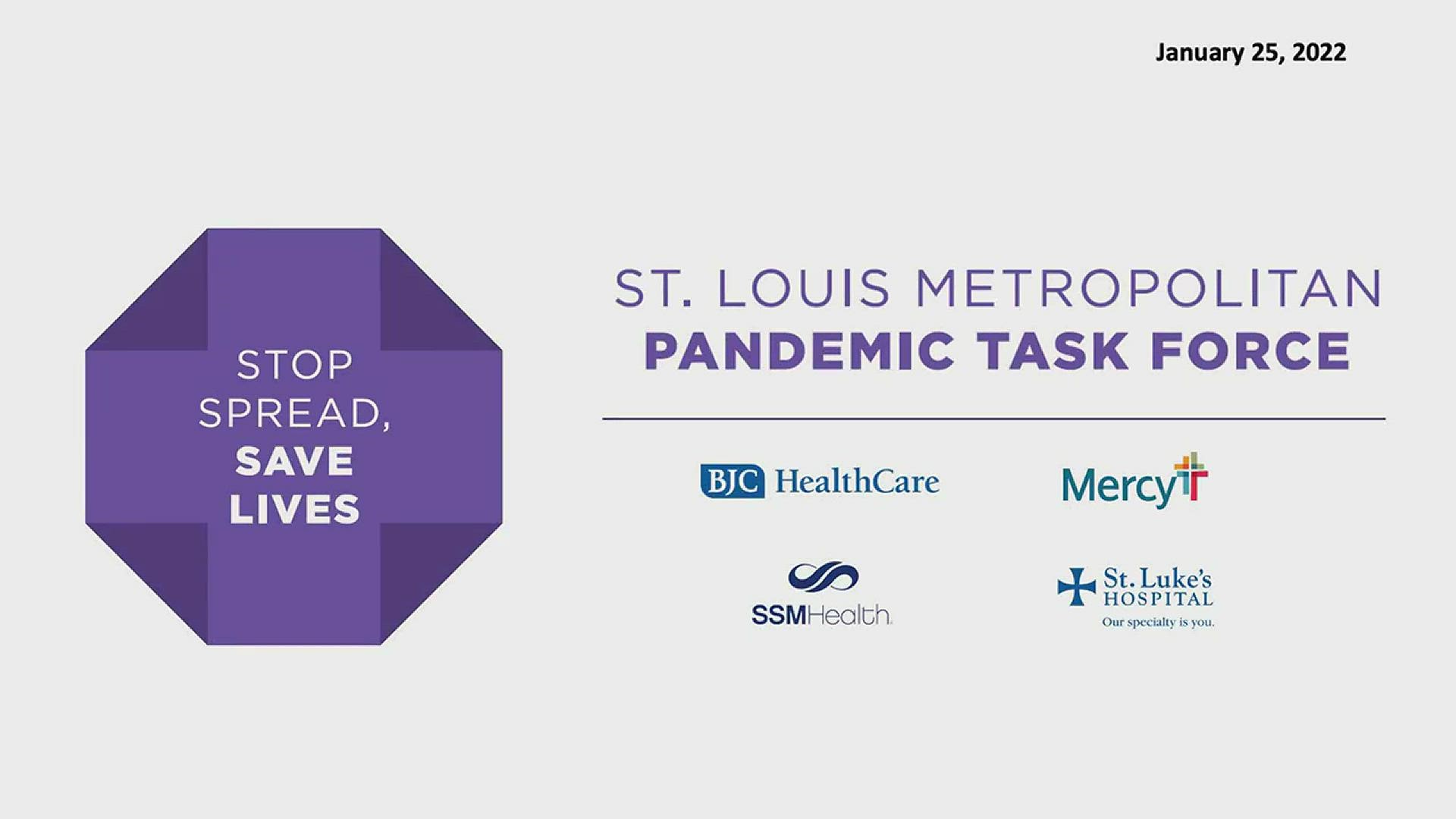ST. LOUIS — The number of COVID-positive patients in St. Louis area hospitals is starting to decline from the record-high numbers of the omicron variant, but hospital leaders said their staff is still stretched thin.
"We're finally starting to see some good progress in our fight against omicron," Dr. Alex Garza of the St. Louis Metropolitan Pandemic Task Force said in a briefing Tuesday. "Our hospitalization totals continue to bounce around a little bit, but in general, they're trending down. And that's really encouraging."
During the briefing, Dr. Garza and Dr. Clay Dunagan presented numbers from Monday that showed the seven-day average for COVID-positive patients in area hospitals at 1,328. That number is down from the peak of 1,385 last week.
The number of COVID-positive admissions is also trending in the right direction. The seven-day average for admissions was 186, down from last week's peak of 219.
Although hospitalizations are coming down, they are still at higher levels than any point before the omicron surge.
"Our hospitals remain full, our emergency departments are full and there's not a whole lot of room in our ICU either," Dr. Garza said. "So although this is improving, many of our staff continue to be out because of COVID or because they're taking care of a loved one or a child whose school has unfortunately been closed because of COVID."
The seven-day averages of COVID-positive patients and new admissions decreased again in data provided by the task force Tuesday afternoon, and the projection models from the task force predict the number of hospitalizations will continue to fall in the coming months.
Dr. Dunagan said the improvements are a "welcome sight", but they expect progress to be slow.
"If you look at the time scale across the bottom [of the models], you'll see that it's going to be many weeks before we get down to levels of virus activity that we had before the surge," he said.


Although hospitalizations have started trending down, COVID-19 deaths in St. Louis area hospitals remained high. On Monday, the task force reported 24 new COVID-19 deaths. Dr. Dunagan said that brought the total number of deaths during the recent surge, which started in mid-November, to 748.
Dr. Dunagan said the omicron variant is not as deadly on a case-by-case basis, but deaths have increased because the number of people becoming infected is so large.
"If you get so many people infected, there are plenty of vulnerable people in that population who are going to get terribly ill and die," he said.
Both Dr. Dunagan and Dr. Garza said the best way to protect yourself from serious COVID-19 symptoms is to get vaccinated and boosted. The task for data shows about 40% of the COVID-positive patients in task force hospitals are vaccinated, but Dr. Dunagan said most of those people are older or have compromised immune systems. He said about 15% of the people in the hospital have received a booster dose of the vaccine.
Dr. Dunagan said those numbers line up closely with national rates.
"Right now during the omicron surge, those who have been vaccinated with booster have about an 80% effectiveness rate in preventing (emergency department) or urgent care visits and about a 90% effectiveness rate in reducing hospitalization," he said.
Dr. Garza echoed the call to get the vaccine and a booster dose for all eligible people, and also thanked people for doing their part to slow the spread of the virus in the community.
"We want to thank everybody who's taking the steps that we know are going to continue to keep transmission down. So thank you for staying at home when you're not feeling well, thank you for continuing to wear masks when you're in public places because we know how easily omicron spreads," Dr. Garza said. "And thank you to everyone who's getting vaccinated and boosted."
The following data was provided by the task force Tuesday afternoon, after the briefing was published.
The data for January 25, 2022.
- New hospital admissions (data lagged two days) decreased – from 134 Monday to 118 Tuesday.
- The seven-day moving average of hospital admissions (data lagged two days) decreased – from 186 Monday to 178 Tuesday.
- The seven-day moving average of hospitalizations decreased – from 1328 Monday to 1306 Tuesday.
- Inpatient confirmed COVID-positive hospitalizations decreased – from 1236 Monday to 1194 Tuesday.
- Inpatient suspected COVID-positive hospitalizations remained the same at 47 Tuesday.
- The number of confirmed COVID-positive patients in the ICU increased – from 193 Monday to 200 Tuesday.
- The number of confirmed COVID-positive patients on ventilators decreased – from 122 to 121 Tuesday.
- 12 COVID deaths are being reported Tuesday.
- The seven-day moving average of COVID deaths decreased – from 19 Monday to 18 Tuesday.
- Across the system hospitals, 202 patients were discharged Monday bringing the cumulative number of COVID-19 patients discharged to 37,642.
- Of the 1,090 hospitalized COVID patients in the three reporting Task Force hospital systems Tuesday – 425 are fully vaccinated. That’s 39% of the patient population.
- There are 28 COVID-positive children who are 0-11 years of age in Task Force hospitals.
- There are 16 COVID-positive children who are 12-18 years of age in Task Force hospitals.
- There are 5 COVID-positive children who are 0-11 years of age and in the ICU.
- There are 2 COVID-positive children who are 12-18 years of age and in the ICU.
- Our staffed bed hospital capacity is at 88% an average across our task force hospitals. The ICUs are at 84% of their total staffed bed capacity.

